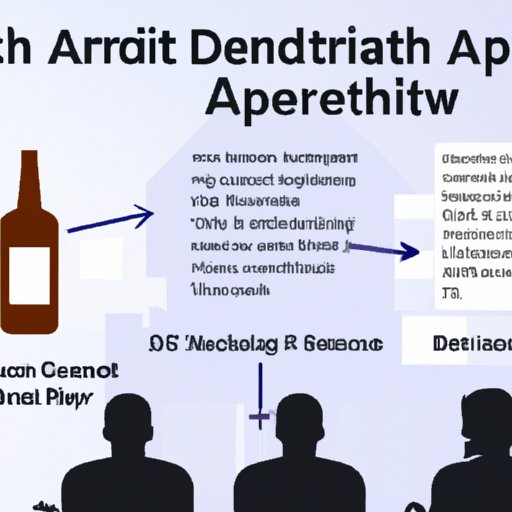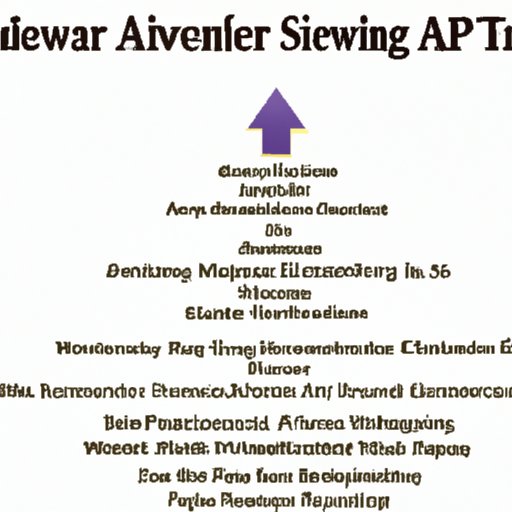Introduction
Alcoholics Anonymous (AA) is a worldwide organization that provides support and resources for people who are recovering from alcohol use disorder. Founded in 1935, AA is based on the 12 Steps, a set of guiding principles that help individuals achieve and maintain sobriety. The program has been credited with helping millions of people around the world overcome alcoholism and lead healthier, more fulfilling lives.
This article will explore the structure, purpose, and philosophy of AA in order to gain a better understanding of how the program works. It will discuss the 12 Steps, meeting structure, spiritual foundations, role of sponsorship, and the many benefits of AA for individuals and families. By the end of this article, readers will have a comprehensive overview of AA and its impact on recovery.

Exploring the 12 Steps of Alcoholics Anonymous
At the heart of AA is the 12 Step program, which is a set of guidelines designed to help individuals reach and maintain sobriety. Each step is focused on different aspects of recovery, such as admitting powerlessness over alcohol, making amends, and developing a deeper connection with the higher power. The steps must be worked through in order, and each one builds upon the previous one.
Let’s take a closer look at each of the 12 Steps:
Step 1: We Admitted We Were Powerless Over Alcohol
The first step involves recognizing and accepting that you are powerless over alcohol and that it has taken control of your life. This is an important first step in recovery, as it allows you to let go of denial and begin the process of accepting responsibility for your actions.
Step 2: Came to Believe That a Power Greater Than Ourselves Could Restore Us to Sanity
Step two encourages you to believe that there is a higher power that can help restore you to sanity. This higher power can be whatever you choose, whether it’s God, nature, or something else entirely. The idea is to open yourself up to the possibility of spiritual healing.
Step 3: Made a Decision to Turn Our Will and Our Lives Over to the Care of God as We Understood Him
Step three requires you to make a conscious decision to turn your will and life over to the care of your higher power. This means relinquishing control and trusting in the process of recovery.
Step 4: Made a Searching and Fearless Moral Inventory of Ourselves
Step four encourages you to take an honest look at your behavior and acknowledge any wrongs you have committed. This includes taking responsibility for any harm you have caused and recognizing any character defects that may have contributed to your drinking.
Step 5: Admitted to God, to Ourselves, and to Another Human Being the Exact Nature of Our Wrongs
Step five requires you to admit to yourself, God, and another human being the exact nature of your wrongs. This is meant to be a cathartic experience that helps you let go of guilt and shame.
Step 6: Were Entirely Ready to Have God Remove All These Defects of Character
Step six requires you to be ready to have your higher power remove any character defects you may have. This is an important step in the process of personal growth and self-improvement.
Step 7: Humbly Asked God to Remove Our Shortcomings
Step seven encourages you to humbly ask your higher power to remove any shortcomings you may have. This step involves surrendering to the process of recovery and having faith that your higher power will help guide you.
Step 8: Made a List of All Persons We Had Harmed and Became Willing to Make Amends to Them All
Step eight requires you to make a list of all the people you have harmed and become willing to make amends to them. This includes apologizing to those you have hurt and doing what you can to repair the damage you have caused.
Step 9: Made Direct Amends to Such People Wherever Possible, Except When to Do So Would Injure Them or Others
Step nine requires you to make direct amends to those you have harmed wherever possible, unless doing so would cause further harm. This step is meant to help you take responsibility for your actions and make peace with those you have hurt.
Step 10: Continued to Take Personal Inventory and When We Were Wrong Promptly Admitted It
Step ten encourages you to continue taking personal inventory and promptly admitting when you are wrong. This is an important step in maintaining sobriety and ensuring that you stay accountable for your actions.
Step 11: Sought Through Prayer and Meditation to Improve Our Conscious Contact With God as We Understood Him, Praying Only for Knowledge of His Will For Us and the Power to Carry That Out
Step eleven requires you to seek out a connection with your higher power through prayer and meditation. This is meant to help you deepen your spiritual connection and find inner peace.
Step 12: Having Had a Spiritual Awakening as the Result of These Steps, We Tried to Carry This Message to Alcoholics, and to Practice These Principles in All Our Affairs
The final step involves having a spiritual awakening as a result of the previous steps and then carrying the message of recovery to others who are still struggling with alcoholism. This is an important part of AA, as it encourages members to share their experiences and help those who are still suffering.
An Overview of Alcoholics Anonymous’ Meeting Structure and Support System
In addition to the 12 Steps, AA also provides support through meetings and a network of sponsors. Meetings are held regularly in most cities and towns across the country, and they provide a safe, supportive environment for individuals to share their experiences and receive guidance from other members. There are several types of meetings available, including beginner meetings, speaker meetings, and discussion meetings.
AA also offers a system of sponsorship, which is a one-on-one relationship between two members. The sponsor serves as a mentor and provides support, advice, and encouragement to the person they are sponsoring. This type of relationship is invaluable in providing emotional and spiritual guidance throughout the recovery process.
Examining AA’s Spiritual Foundations and Program of Recovery
One of the key components of AA is its spiritual foundation, which is based on the belief that a higher power can help individuals recover from addiction. This higher power can be whatever the individual chooses—God, nature, or anything else—and it is meant to provide comfort, strength, and hope during the recovery process.
AA also emphasizes the importance of surrender and acceptance. This means letting go of control and allowing the higher power to take the lead in your recovery. Additionally, AA teaches individuals to practice the 12 Steps in all areas of their lives, not just when it comes to alcohol. This is an important part of maintaining sobriety, as it helps individuals develop healthy coping strategies and build a stronger support system.

Understanding How AA Helps People Overcome Alcoholism
AA provides numerous benefits for those struggling with alcohol use disorder. First and foremost, it helps individuals develop healthy coping strategies and create a strong support network. This is essential for long-term recovery, as it gives individuals the tools they need to manage their cravings and avoid relapse.
AA also encourages individuals to work closely with professional treatment providers. This is important for ensuring that the individual receives the best possible care and that any underlying mental health issues are addressed. Additionally, AA helps individuals strengthen their relationships with family and friends, which is an important part of rebuilding a sober life.
Investigating the Role of Sponsorship in AA
Sponsorship is an integral part of AA and plays a vital role in the recovery process. A sponsor is someone who has achieved sobriety through the program and is willing to offer support and guidance to those who are still struggling. The role of the sponsor is to provide emotional and spiritual guidance, listen without judgment, and offer advice when needed.
Finding a sponsor can be a challenge, but it is worth the effort. AA meetings are a great place to start, as they provide a safe space to meet potential sponsors and form meaningful connections. Additionally, online forums and social media groups can be great resources for finding a sponsor.

Looking at the Benefits of AA for Individuals and Families
AA provides numerous benefits for individuals and families affected by alcohol use disorder. On an individual level, AA can help improve physical and mental health, increase social support, and strengthen relationships. For families, AA can help reduce conflict, promote understanding, and create a sense of unity and connectedness.
Additionally, AA can provide financial benefits. Many insurance companies cover the cost of AA meetings, and some employers even offer reimbursement for attending meetings. This can help offset the costs associated with recovery and make it easier for individuals to access the help they need.
Conclusion
Alcoholics Anonymous is a powerful program that has helped millions of people around the world recover from alcohol use disorder. The program is based on the 12 Steps, a set of guiding principles that help individuals reach and maintain sobriety. Additionally, AA provides support through meetings, sponsorships, and a network of peers. Ultimately, AA can provide individuals with the tools they need to lead healthier, more fulfilling lives.
The benefits of AA are numerous and include improved physical and mental health, increased social support, strengthened relationships, and reduced conflict within families. If you or someone you know is struggling with alcohol addiction, AA can provide invaluable support and guidance throughout the recovery process.
(Note: Is this article not meeting your expectations? Do you have knowledge or insights to share? Unlock new opportunities and expand your reach by joining our authors team. Click Registration to join us and share your expertise with our readers.)
